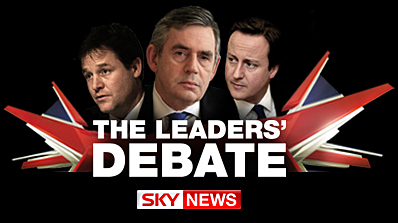A UK TV First Tonight – An Election Debate
Philip M. Stone April 15, 2010 Follow on Twitter
For all the talk the Brits make about their democracy they have never held a nationally televised debate between the major party leaders during a general election campaign, but that comes to an end Thursday night when the ITV terrestrial commercial network hosts the first such event.
 UK elections are May 6 with Labor Prime Minister Gordon Brown currently an underdog to Conservative leader David Cameron, although polls indicate a possible hung Parliament – no party getting a majority because a third party – the Liberal Democrats – are expected to win about 20% of the vote. Nick Clegg, the Liberal Democrat leader, has a golden opportunity -- his party doesn’t usually get much air time but he’s young and not hard on the eyes, so if he can convince the voters that Labor and Conservatives are more of the same and only the Liberal Democrats are offering real change then there’s no telling how he could mix everything up. The leader of the party that wins the most seats in Parliament is usually asked by the Queen to form a new government and under the UK districting system it is well possible that while Conservatives overall may get the most votes Labor could end up with the most seats. UK elections are May 6 with Labor Prime Minister Gordon Brown currently an underdog to Conservative leader David Cameron, although polls indicate a possible hung Parliament – no party getting a majority because a third party – the Liberal Democrats – are expected to win about 20% of the vote. Nick Clegg, the Liberal Democrat leader, has a golden opportunity -- his party doesn’t usually get much air time but he’s young and not hard on the eyes, so if he can convince the voters that Labor and Conservatives are more of the same and only the Liberal Democrats are offering real change then there’s no telling how he could mix everything up. The leader of the party that wins the most seats in Parliament is usually asked by the Queen to form a new government and under the UK districting system it is well possible that while Conservatives overall may get the most votes Labor could end up with the most seats.
So there is everything to play for and an ITN/Independent poll indicates the Brits are taking this debate very seriously with some 65% of probable voters saying they intend to tune in and half of those indicating they could well be swayed by what they see and hear. No wonder, then, that the candidates are treating this initial debate -- which will involve only questions from the audience -- as if it could decide the election. In the next two weeks there will be two more 90-minute debates, one hosted by Sky and the other by the BBC.
All sides have called in the debate-experienced Americans (including those who coached President Obama) to help them practice and avoid pitfalls – they know full well it is not just the words coming out of mouths but also the body language that viewers will notice. Brown is said to feel awkward in debates and comes across a bit stodgy – he was the last to agree to the debate series and only after long arduous negotiations – while Cameron is considered charismatic but does he come over too posh and polished for those in the middle part of the country?
Each party has agreed to 78 very strict rules of conduct that includes, for instance, Rule 57 that requires all the candidates to shake hands once the debate is over. The rules don’t mention the use of make-up but no one will want to get caught out as Richard Nixon did in the initial US debate in 1960 when John Kennedy said he wouldn’t wear make-up so Nixon did likewise and he came across on TV all sweaty and not trustworthy with many historians saying that probably cost him the election.
See also in ftm Knowledge
Television News - Bright Lights, Big Coverage
The global reach of television news has never been greater. The digital age has expanded that reach to satellite channels and the Web but it has also forced television news to mature. This ftm Knowledge file shows the gains and the pains. 74 pages PDF (December 2010)
|


